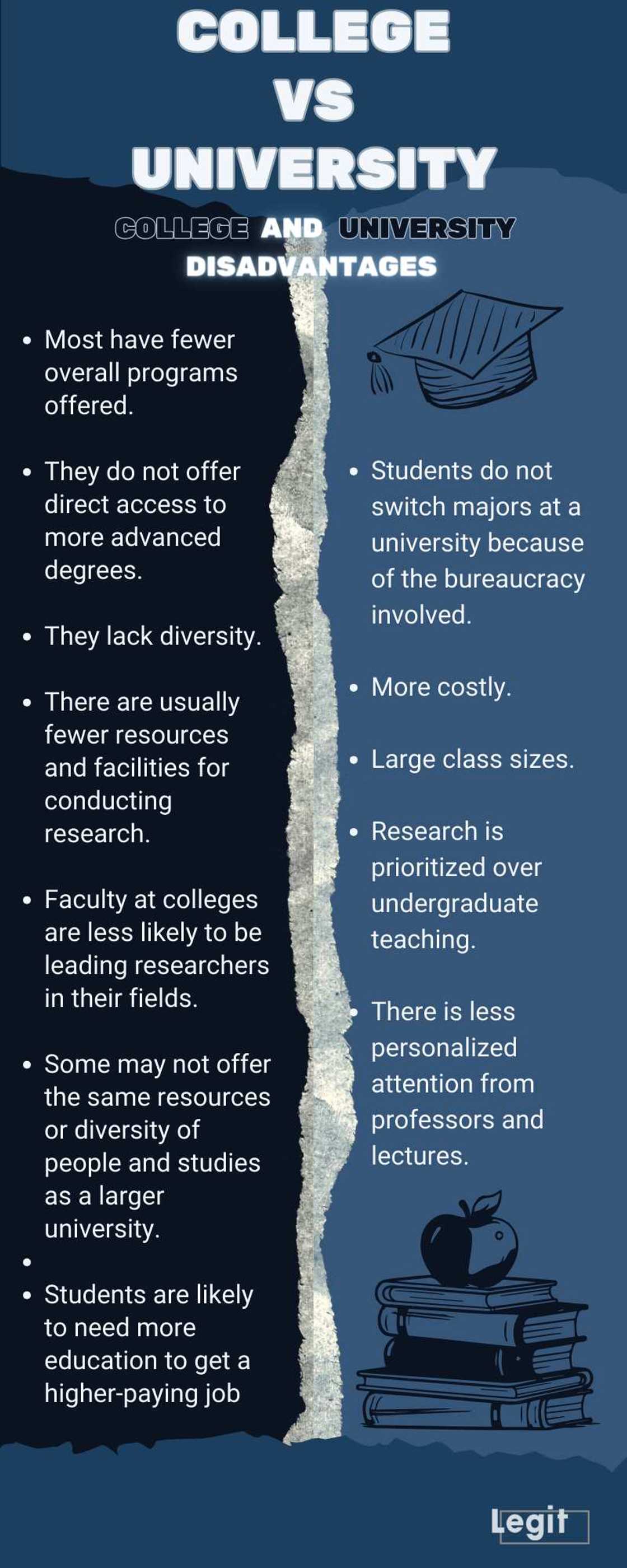College vs university: What is the difference and which one to use?
The debate about college vs university often comes into play whenever students complete their high school studies. To shed light on the two, Prof. Simon Marginson, a Professor of Higher Education at the University of Oxford, provides insights into the difference between colleges and universities, helping students make informed decisions about their educational paths.

Source: UGC
TABLE OF CONTENTS
- Key takeaways
- Colleges vs universities: Understanding the differences
- Colleges vs universities: Difference in level of education
- Misconceptions about colleges and universities
- Tertiary Education: Expert tips and preparation for work
- What is a college?
- What is a university?
- Which is better- college or university?
- Which degree is better- college or university?
- College vs university vs institute
- Is Oxford a university or college?
- Is Harvard a college or a university?
- What is the difference between college and university in Kenya?
- What is the difference between a 4-year college and a university?
- What is the #1 university in the world?
Key takeaways
- Some tend to think that education at a university is better than at a college.
- In most countries, universities admit people with higher grades than colleges.
- It is important to note that most universities have various schools or colleges that offer various courses.
Colleges vs universities: Understanding the differences
Professor Simon Marginson, a Professor of Higher Education at the University of Oxford, explained in an interview that the primary difference between a college and a university varies by country.
He said universities offer first and higher degrees, including postgraduate programmes, while colleges are for programmes beyond school that do not necessarily involve degrees. However, Professor Simon mentioned that this distinction can sometimes be blurred. He explains:
In the United States, the word 'college' is used for almost everything, at the first-degree level. People talk about going to college when they're going to prominent research universities. College can also mean four-year colleges, liberal arts colleges, or for-profit colleges. The word is used very broadly in the US.
In the English system, colleges are usually seen as separate from universities, and colleges are mostly colleges for further education, which offer some higher education programmes but also mostly sub-degree programmes. 'Other tertiary,' you might call them. But then, when you look at the names of universities in the UK, you'll see that there are universities called King's College London and University College London, which are giant global universities.
The word college in the UK is also sometimes applied to universities. But generally speaking, when people in the UK say college in general, they don't mean university.
When you go to other countries, it's different again. Different kinds of institutions have different names. For example, the second higher education sector in the Netherlands is called the Universities of Applied Sciences. They could have been called colleges or polytechnics, but they're called Universities of Applied Sciences. The same broad title is used in Finland and Germany, where the Fachhochschulen is similar, I suppose, to the Universities of Applied Sciences.

Source: UGC
Colleges vs universities: Difference in level of education
Professor Simon also explained the differences between colleges and universities regarding the type of education they offer undergraduates and graduates. He said:
If we understand by colleges, sub-degree, then one- and two-year programmes, which might have certificates or diplomas attached to them but not degrees, would be provided. But then you get plenty of cases where institutions are not regarded as universities but are considered colleges that offer degree programmes. And you see this increasingly in many countries.
We've seen an uprising of the level of many courses and institutions. Degrees used to be a relatively small matter; a small proportion of the population would go into degree programmes. Now, whether you're talking about universities or you're talking about colleges, a lot more people are going into degree programmes than before.
Generally, education is getting longer. People are going to higher levels, and so on. At the last count, which is 2022, about 42% of all young people will go into some kind of tertiary education. Most of those are doing degree programmes, whether in universities or other institutions called institutes or colleges.

Read also
Disappointment as FG flops on promises to fast-track passport processing, begin home delivery
Misconceptions about colleges and universities
The education expert addresses common misconceptions students and parents may have regarding colleges and universities. Here are some key points he highlighted:
1. Specific vocational training directly translates to job readiness:
We know that some jobs require specific skills, and you need to be trained in those skills. But we also know that in all jobs, employers like new employees to be adaptable, quick to learn, and able to work together with others, work in teams, solve problems, be innovative and critical and creative thinkers about the tasks that they have in front of them, and to be good communicators, have a good understanding of what they're being told to do.
We know that most, if not all, employers want these broad-based general skills. However, many employers also want particular skills. It depends on the job, but employers want both specific and broad-based general skills in many jobs.
2. Job market vs career path:
We also know that when people graduate, they often don't end up working in jobs they're trained for. They often end up working in other sectors. Usually, people work in jobs that need particular skills, yet these are not the skills they train for. They're a new set of skills they're learning on the job.
The need to be flexible at the point of entry into career work means that it's often helpful to do broad-based educational programmes like social sciences, business studies, humanities, general science, and maths.
While parents often feel more secure if their child is working in a training programme that produces an exact set of skills for an actual job, that's not how the world usually works.
Parents shouldn't worry too much if their child is going into a programme that is broader-based and more general or is more about academic knowledge than it is about work because the chances are if their child has graduated successfully, got a good level of qualification, they'll still be employable quite broadly, and they'll learn a lot on the job pretty quickly because that's how we know most of what we do at work. The education-work relationship is more flexible than most of us think it is.

Source: UGC
Tertiary Education: Expert tips and preparation for work
Professor Simon provided essential advice for students transitioning from universities/colleges to the workforce. He mentioned:
- Avoid narrow programmes at the tertiary stage.
If you do a very narrow programme that doesn't prepare you to work with people, solve problems, be flexible and responsive, and respond to new pressures at work, then you perhaps won't do quite as well in your career as you would if you'd done a more general program.
- Focus on what motivates you and what you care about to develop yourself effectively.
The most important thing about post-school education, tertiary education, is doing what you're good at, learning, and building your confidence, agency, and ability around whatever programme you're studying. So that you come out confident, capable, and enthusiastic and have yet to spend three or four years doing something you didn't like, where you wouldn't have learned so well, it's important to develop yourself well during the tertiary training programme, whatever the course.
- Be prepared for unexpected changes and opportunities in life.
We can only partially anticipate what will happen several years ahead or what opportunities will be available. We can plan, but life evolves differently than we intend. Trying to precisely forecast, plan, and lock it down with a clear single pathway doesn't work well.
When you graduate, and you find no jobs for someone on that pathway, but there might be many other kinds of jobs that you see, and then the graduate has to shift sideways, that does happen quite a lot.
It is essential to be ready for that and to deal with it when it happens. And you're more likely to be able to deal with that if you've got an excellent broad-based set of skills coming out of your tertiary programme rather than just narrow skills. You've got to take whatever opportunities come your way when they come, and you have to be ready to deal with that challenge. So being flexible is vital, as well as being well developed during education, having studied hard, and progressing as well as possible.
- Have a combination of broad-based and specific skills
The ideal combination for many employers is that you have an excellent general skill base so that you're literate, can handle numbers, can use IT, and can communicate well technically. But at the same time, you've also learned some particular skills. You've learned something quite vocational and practical.
That shows you can learn something precise and valuable while having a broad skill set. That combination—a broad education and specific skills on your resume—is probably the ideal preparation. I think it is the best preparation you can have for work. Your resume looks best, and you are also best prepared.
There are many things to consider when choosing between university vs college courses. Some of these things include:
- On-campus facilities and amenities
- Accreditation
- Type of school
- Affordability
- Geographic location
What is the difference between a college and a university? Have a look at the major variances between the two.

Read also
Study abroad with 2.2 and 3rd class degrees: Canada-based man shares uplifting info for Nigerians

Source: UGC
What is a college?
Colleges are referred to as higher institutions offering undergraduate degrees and certificates. They cater to various students such as high school students, adult learners, and others.
They focus more on teaching and are less devoted to research efforts, although many colleges still have research programmes.
Unlike in university, college education focuses more on everyday, functional or applied knowledge and practical learning – more or less teaching you how to do things. A course at a college can range from one to three years.
Types of colleges
- Community colleges - They are also called junior colleges; they offer associate degrees and certificate programs.
- Vocational and technical colleges - They provide specialized training for specific career fields.
- Liberal arts colleges - They offer diverse education to students consisting of different subjects.
Advantages
- They have a closer and more unified student community.
- There is a focus on undergraduate teaching.
- Students are likely to get more personalized attention from lectures.
- They are more devoted to undergraduate teaching and less focused on research efforts.
- Tuition costs a fraction of a four-year university, making them more affordable.
- For students with certain interests, colleges often have additional curriculum specialization.
Disadvantages
- Most have fewer overall programs offered.
- They do not offer direct access to more advanced degrees.
- They lack diversity.
- There are usually fewer resources and facilities for conducting research.
- Faculty at colleges are less likely to be leading researchers in their fields.
- Some may not offer the same resources or diversity of people and studies as a larger university.
- Students are likely to need more education to get a higher-paying job.

Source: UGC
What is a university?
A university is an institution of higher education and research that awards academic degrees in several academic disciplines. Nigeria is home to many state and federal universities.
Which is better- college or university?
Some universities offer special programmes where their students can earn both an undergraduate and a graduate degree in a reduced amount of time. It is challenging to say which is better between a college and a university because individual needs and strengths vary widely.

Read also
“Scholarships up to £10,000”: Top UK university invites Nigerians for fascinating opportunity
Generally, universities are bigger and more prestigious institutions offering both graduate and undergraduate degrees. Statistics also show that university graduates have more earning power compared to college graduates.
Most undergraduate degrees take about three to five years to complete. Unlike in college, where students are not many in a class, at the university, you are likely to sit in a lecture theatre with over 150 people, listen to a professor talk, and then read and hand in assignments and essays.
Types of universities
- Research universities - They have professors who conduct research, report their findings, and teach. Many research universities emphasize academics rather than vocational training, and students may not be prepared for specific professions.
- Public universities - These are universities that the state/government funds.
- Private university - Receive no public funding.
Advantages
- Offers more programs and has a more diverse community of students
- Lecturers are likely to be well-known experts in their fields of study.
- Availability of research opportunities.
- There is more access to advanced degrees and more interaction with graduate students.
Disadvantages
- Students do not switch majors at a university because of the bureaucracy involved.
- More costly.
- Large class sizes.
- Research is prioritized over undergraduate teaching.
- There is less personalised attention from professors and lectures.

Source: UGC
Which degree is better- college or university?
All things considered, you might want to join programmes that are offered through university and college partnerships. With these kinds of programmes, you would generally spend a year in college to earn a diploma and then a further three or four years in university to earn your degree.
Such a route is likely to be the best. Finally, before making any hasty decisions, do a lot of research. Talk to former and current university and college students about what they are doing and their current feelings about the whole thing, and ask potential employers what kind of education they'd suggest to prepare you for the real world best.
College vs university vs institute
Usually, a college focuses on undergraduate education and may not offer graduate courses. A university, on the other hand, is a bigger institution that offers undergraduate, graduate, and doctoral courses. In most countries, an institute typically focuses on specialised research or training in a particular field. Institutes normally do not offer undergraduate degrees.
Is Oxford a university or college?
Oxford is a university. It comprises a central university and 39 self-governing colleges.
Is Harvard a college or a university?
It is both. Harvard University is the overarching institution. It encompasses various schools, including Harvard College that offer undergraduate courses.
What is the difference between college and university in Kenya?
In Kenya, universities typically offer diploma, undergraduate and graduate courses. On the other hand, colleges offer artisan, certificate, and diploma courses. Usually, colleges do not offer undergraduate programmes, unless they are university constituent colleges.
What is the difference between a 4-year college and a university?
As mentioned earlier, the primary difference between a four-year college and a university lies in their scope and focus. Four-year colleges normally offer undergraduate courses and may not offer graduate programmes.
What is the #1 university in the world?
According to Times Higher Education, the top university in the world is the University of Oxford United Kingdom.
There are many things to consider when it comes to comparing college vs university. All in all, programme value and education are perhaps the most important factors to consider when considering your options.

Source: Original
Legit.ng recently published a list of the best state universities in Nigeria. State universities are gradually taking their places in the university rankings in Nigeria.
In the past, many believed state universities could not provide quality education compared to federal and private universities. State universities are now getting more student applications and are almost on the same level as compared to federal universities in Nigeria.
Source: Legit.ng

Mercy Mbuthia (Lifestyle writer) Mercy Mbuthia is a content writer with five years of experience writing on various topics, including biographies, entertainment, and lifestyle. She joined the Legit team in 2019. Mercy earned a Master of Science (Food, Nutrition & Dietetics) from Dedan Kimathi University in 2022. Her articles have appeared on several media sites such as The Health Channel, The Nation, Tekrati, ValiantCEO and Celebrity Leader. In 2023, Mercy finished the AFP course on Digital Investigation Techniques. Email: mercymmbuthia18@gmail.com

Cyprine Apindi (Lifestyle writer) Cyprine Apindi is a content creator and educator with over six years of experience. She holds a Diploma in Mass Communication and a Bachelor’s degree in Nutrition and Dietetics from Kenyatta University. Cyprine joined Briefly.co.za in mid-2021, covering multiple topics, including finance, entertainment, sports, and lifestyle. In 2023, she finished the AFP course on Digital Investigation Techniques. She received the 2023 Writer of the Year Award. In 2024, she completed the Google News Initiative course. Email: cyprineapindi@gmail.com











